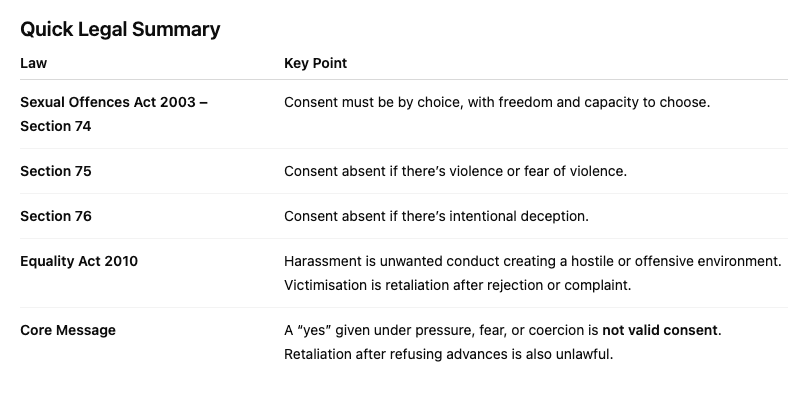It Was Consent — But It Wasn’t a Choice: Coercion, Consent, and the Law in the UK
⚠️ Content Warning:
This post discusses sexual coercion and consent. Please read with care — the aim is to raise awareness, not cause distress.
(stock photo from unsplash)
It Was Consent — But It Wasn’t a Choice: Coercion, Consent, and the Law in the UK
When I first started studying law, I thought the rules on consent were simple — clear, defined, and protective.
Now, as I prepare to begin my LLM in Legal Practice and work towards the SQE, I’ve gone deeper. I’ve read more cases. I’ve studied the Sexual Offences Act 2003 in detail. On paper, the law is precise. In real life, it’s far messier.
It’s in the gap between statute and lived experience that so many women’s stories get lost.
Because sometimes a person says “yes” — not out of desire, but out of fear. A “yes” given with a tight chest, no way out, and no real choice at all.
These are two such stories.
Story 1 – A Solo Traveller in America
You’re travelling alone in America.
You don’t know the streets.
You don’t know the public transport system.
You don’t have friends or family nearby.
Before your trip, you’d become friends with a man who lived in the city. You’d spoken enough to feel comfortable meeting up while you were there. He has a girlfriend, so it doesn’t even cross your mind that anything would happen beyond a platonic meet-up.
The day passes, and as night falls you’re ready to head back to your accommodation. But he says it’s too far for him to drive home, and he’s tired. He suggests staying over, promising to give you a tour the next day.
You agree — because why wouldn’t you? In a foreign city, spending time with someone you know feels safer than being completely alone.
But later that night, things change. He starts insisting on having sex. You say no. You change the subject. You try to laugh it off. The pressure doesn’t stop.
Your thoughts start racing:
If you keep saying no, will he get angry?
If you push him away, will it escalate?
If you ask him to leave, will he?
It’s late. You’re far from home. You don’t know where you’d go or how to get there safely.
Eventually, you give in.
On paper, it’s “consent.”
In reality, it’s survival.
The next morning, you brush it off. You tell yourself it was just a bad situation, that it’s over now, and there’s no point dwelling on it. You focus on the day ahead.
But later — maybe weeks, maybe months — it hits you. The law is clear. This wasn’t a misunderstanding. This wasn’t a one-off bad choice.
This was rape.
Story 2 – Harassment in the Workplace
Sexual harassment isn’t always about strangers or situations abroad — it can happen in familiar places, with people you work alongside.
A woman works as an office administrator for a real estate company in London. The company leases a flat above the office for staff accommodation, and she rents one of the rooms.
A property manager from the company’s head office — based nearby in the property management department — offers to help her replace some furniture in her room. At first, it feels like a simple, practical favour between colleagues. But while in the room, he begins to touch her leg.
She rejects him.
A few days later, she notices a shift in his behaviour. His tone becomes sharper, his manner more aggressive, and interactions that were once professional now feel tense and uncomfortable.
Later, she learns from other staff that previous employees had made complaints of sexual harassment — but the company had taken no action. She doesn’t know who those complaints were about, but the knowledge adds another layer of unease.
This is workplace sexual harassment — not only because of the unwanted physical contact, but also because of the change in treatment after she refused him.
From a Legal Perspective
Sexual Offences Act 2003 – Consent and Coercion
Section 74 – Consent means agreeing by choice, with the freedom and capacity to make that choice.
Section 75 – Consent is presumed absent if there’s violence or fear of violence.
Section 76 – Consent is absent if there’s intentional deception.
The key word is freedom. If you only “agreed” because you felt trapped, unsafe, or worn down by relentless pressure, you did not have true freedom to choose.
In the UK, consent given under duress — whether physical, emotional, or situational — is not valid consent. This can amount to rape or sexual assault, even if the victim didn’t resist physically or only recognised it as such later. There is no time limit to report sexual offences.
Equality Act 2010 – Workplace Harassment and Retaliation
Harassment occurs when unwanted conduct related to sex violates a person’s dignity or creates an intimidating, hostile, degrading, humiliating, or offensive environment.
Victimisation happens when someone is treated badly because they rejected or complained about harassment.
Employers have a legal duty to take reasonable steps to prevent harassment and respond to complaints. Failing to act can lead to legal liability.
In the workplace scenario, the unwanted physical contact, followed by a change in behaviour after rejection, meets the definition of harassment — and possibly victimisation.
What I’d Tell a Friend
While responsibility always lies with the person who ignores boundaries, here are steps that may help you exit a risky situation — whether in personal life or at work:
Trust Your Instincts – If something feels off, it probably is.
Maintain Your Space – Keep accommodation or personal areas private where possible.
Have an Exit Plan – Know safe public spaces you can reach quickly.
Document and Report – In the workplace, keep a written record of incidents and changes in behaviour.
Use Your Phone as a Lifeline – Call or message someone you trust; in the UK, dial 999 for emergencies or 101 for non-urgent police help.
Know Local Support Options – In the UK, the Ask for Angela scheme and organisations like Rape Crisis and Victim Support can help.
Why I’m Writing This
Studying the law has shown me how protective the statute can be — but also how rarely those protections are discussed in everyday language. Too many people think consent is just about saying “yes” or “no.” The law says otherwise.
If you’ve ever “agreed” to something only because you felt you had no other choice — whether you recognised it in that moment or only realised much later — you are not to blame. The law recognises that survival is not consent, and that harassment in any form is unacceptable.
If you need help in the UK:
Rape Crisis England & Wales – 0808 500 2222
Victim Support – 0808 168 9111
Police (UK) – 999 in an emergency
Survival is not consent. Trust is not an invitation. And as a future solicitor, I’ll keep saying that until it’s no longer something we have to explain.


